French president Emmanuel Macron "reiterated his support for the transition" in Chad and promised "soon, new budgetary aid", said the Elysee Palace on Monday evening (5 July), after a meeting with the head of the military junta and self-proclaimed Chadian president, Lt Gen Mahamat Idriss Déby Itno, in Paris.
Déby had been invited by Emmanuel Macron as part of the preparation for the next G5 Sahel summit, and more generally, to discuss internal and external security issues during his "first official working visit in France", the leaders announced in a joint statement.
Macron "reiterated his support for the transition and announced the implementation, at an early date, of new budgetary aid". The two leaders "called for a rapid treatment of the Chadian debt, within the common framework of the debt". "They examined the progress of the political transition in Chad" and "stressed the need to do everything possible to achieve the objectives of an inclusive, peaceful and successful transition".
Mahamat Idriss Déby has been leading a Transitional Military Council (TMC) of 15 generals since the death of his father, Idriss Déby Itno, who ruled the country for 30 years before perishing at the front in a fight against rebels on 19 April 2021.
The following day, the TMC dissolved the Parliament and the government and repealed the Constitution. It promised "free and fair" elections after an 18 month transition period, renewable once.
The international community, led by the African Union (AU) and France, demanded that this period does not exceed 18 months. However, at the end of June, Mahamat Déby hinted that he was not ruling out an extension.
Nonetheless, Macron's words following the Chadian president's visit confirm France's continued support for its formal colony. France is the third country visited by Déby since he took power in April, after Niger and Nigeria, and Macron was the only Western head of state to attend Idriss Déby's funeral on 23 April 2021. On that occasion, the French president vowed that France would continue to stand with Chad. "France will never let anyone, either today or tomorrow, challenge Chad's stability and integrity," he said at the ceremony.






